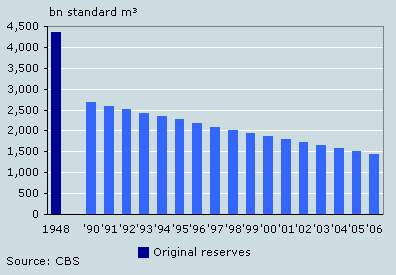Higher profits from oil and gas extraction help to fill government coffers

In 2006, revenues from oil and natural gas extraction were the highest since 1990. The bulk of natural gas revenues is paid into the government coffers. The value of Dutch natural gas and petroleum reserves has increased substantially in recent years, whereas the volume is declining steadily.
Net revenues from oil and gas extraction considerably higher
Net proceeds from oil and gas extraction in the Netherlands rose distinctly in recent years. In 2006, oil and gas extraction accounted for 13 billion euro, the highest amount since 1990. This is mainly due to soaring oil and gas prices. The average volume of oil and gas extracted annually has diminished since 2000 relative to the preceding years.
Net proceeds oil and gas extraction in the Netherlands

80 percent paid into government coffers
On average, 80 percent of net oil and gas proceeds were paid into the government coffers in the period 1990-2006. Natural gas revenues amounted to 10 billion euro or about 7 percent of total government revenues in 2006.
Value of oil and gas reserves mounts up to 120 billion
Soaring oil and gas prices have increased the value of the remaining reserves in the Netherlands. By the end of 2006, the value of the reserves was assessed at over 120 billion euro, the highest since 1990, although the volume of the reserves has diminished over the years.
Value oil and gas reserves (end-of-year figures)

Diminishing oil and gas reserves
The volume of Dutch oil and gas reserves has steadily fallen since the late 1960s. By the end of 2006, over 1,400 billion cubic metres of natural gas remained. Currently, two thirds of the original natural gas reserves has been extracted, i.e. more than the entire volume of the natural gas field in the province of Groningen. More than three quarters of the original Dutch oil reserves has been extracted.
Natural gas reserves in the Netherlands (end-of-year figures)

Cor Graveland and Erik Veldhuizen